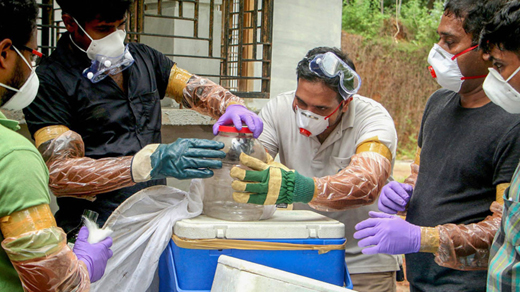Authorities fear Nipah virus may spread to Goa and Mumbai; hospitals on alert
Mangalore Today News Network
Kerala, May 22, 2018 : The Goa health department has asked all hospitals to remain alert in the wake of reports of Nipah virus outbreak, which has claimed at least three lives in Kerala. Goa Health Minister Vishwajit Rane said that random checks are also being done on people coming to the state from Kerala. He said that this is being done in accordance with the directives of the central government.

The Goa health department is constantly in touch with the Kerala government to ascertain the impact and spread of the rare and deadly Nipah virus.
Instructions have also been given by the Goa health department to check passengers coming to the coastal state in trains from Kerala. All medical colleges and private hospitals have also been put on alert to tackle any possible case of Nipah virus.
Authorities fear that the deadly virus can spread to Goa and Mumbai in the next few days.
The outbreak of Nipah virus in Kerala has so far claimed three lives, while one person is undergoing treatment and eight are under observation.
Considering the seriousness of the situation, the Centre on Monday rushed a high-level team from the National Centre for Disease Control (NCDC), including its director, Dr Sujeet Kumar Singh and Head of Epidemiology, Dr SK Jain.
According to information available on World Health Organisation (WHO), India has in the past documented human-to-human transmission of the rare Nipah virus. The global health body says that the virus causes severe disease in both humans and animals.
As per a report on WHO website, Nipah is a newly emerging virus, which gets transferred from animals to humans, and it causes severe disease in both animals as well as humans. The natural host of the virus are fruit bats of the “Pteropodidae Family, Pteropus genus”.
The virus first came to light in 1998 when a disease outbreak was reported from Kampung Sungai Nipah in Malaysia. As this suggests, the nomenclature of the disease also comes from the name of the place in Malaysia.
There is no vaccine available for either humans or animals acquiring the rare virus. The primary treatment for human cases is intensive supportive care, says WHO.
courtesy:Zeenews
- Mangaluru: Woman gang-raped near Netravati river, auto driver among three arrested
- Kukke Subrahmanya temple retains title as Karnataka’s richest temple with Rs 155.95 crore annual revenue
- Karnataka HC orders crackdown on clinics run by ’unqualified doctors’
- Karnataka relaxes age rule for class 1 admission to 5.5 Years for 2025-26 academic year
- Bantwal: Rider dies as scooter falls into drain
- Bantwal: Mobile shop owner attacked with machete
- Mangaluru: CCB cops arrest drugs peddler at Lalbagh; seize MDMA
- Police ask motorists to avoid the Padil–B.C. Road stretch of NH75 on April 18
- Exploring Careers in Pharmacy: Opportunities and Programs at NGSMIPS
- Auto-rickshaw collides with container truck at Brahmavar black spot; several injured
- Confederation questions rise in castes under SC/ST communities
- District in-charge Secretary calls for more measures to encourage start-ups
- Over 30,000 students to write CET in DK, Udupi for two days from today
- India slams Pakistan Army chief’s remarks: ‘Kashmir’s only relation with Pak is…’
- Removal of sacred thread at CET centre in Shivamogga triggers row
- JD Vance, wife Usha to visit India from April 21-24, hold talks with PM Modi
- 22 Naxalites arrested, explosives seized in Chhattisgarh
- CRPF ’backbone’ of mission to rid country of Naxalism by March 2026: Amit Shah
- BJP likely to get new chief by April-end as state-level polls conclude: Sources
- No end in sight to Karnataka lorry strike, essential items may become costlier
- Supreme Court considers interim stay on parts of waqf act, centre pushes back
- CJI Sanjiv Khanna names Justice B R Gavai as successor
- Supreme Court hears multiple pleas challenging waqf (Amendment) act
- Tree felling near University of Hyderabad: SC halts deforestation till next hearing
- Autorickshaw driver crushed to death after metro viaduct falls on vehicle in Bengaluru
- Skills and Competencies Take Center Stage at MSN Dialogue Series
- Court remands Maoist Lakshmi to six-day police custody
- Sandhya Shenoy honored with Society for Materials Chemistry Medal-2024
- White Cornus Apartment in Mangaluru
- City girl wins first place in state-level spell bee competition
- Alleged ‘Love Jihad’ Case in Mangaluru: Woman left home voluntarily, says police
- Girl fatally struck by reckless two-wheeler near Belman
- New residential complex for the judges inaugurated in Mangaluru
- Absconding accused nabbed after 8 years
- Truck with cylinders turns turtle in Beltangady
- Bhoota Kola artist dies of cardiac arrest
- Development of the country should be our goal: Ganesh Karnik
- Container truck gets stuck under Modankap railway bridge
- Truck crushes bike’s pillion rider near BC Road
- Head constable dies of heart attack
- CITY INFORMATION
- TRAVEL
- TOURIST INFORMATION
- HEALTH CARE
- MISCELLANEOUS




 Write Comment
Write Comment E-Mail To a Friend
E-Mail To a Friend Facebook
Facebook Twitter
Twitter  Print
Print 


